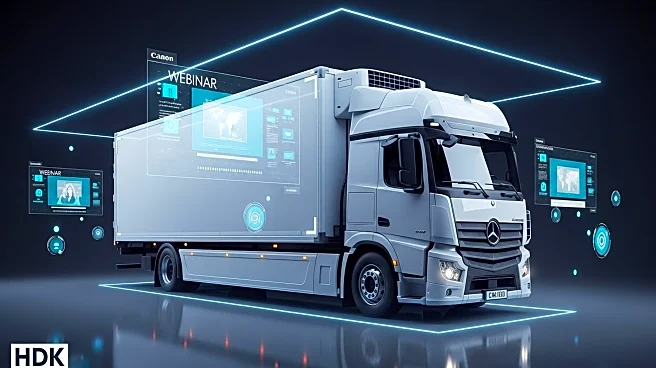What's Happening?
The Truckload Carriers Association (TCA) is hosting two virtual webinars for its refrigerated division, aimed at providing education on temperature-controlled logistics. Scheduled for October 21 and November 6, these webinars are based on popular sessions from the TCA Refrigerated Meeting. The first webinar, 'Refrigerated Cargo Claim Pains and Remedies,' will be led by insurance underwriter Chris Montez and attorney Sam Rizzitelli, focusing on strategies to avoid and address cargo claims within the refrigerated supply chain. The second webinar, 'Future-Proofing Your Fleet: Smart Procurement Strategies Amid Tariffs and Market Uncertainty,' will explore how carriers can navigate economic shifts and leverage tariff policies to optimize fleet investments.
Why It's Important?
These webinars are crucial for industry professionals seeking to enhance their knowledge and strategies in refrigerated logistics. The focus on cargo claims and procurement strategies addresses key challenges faced by fleets, particularly in light of economic uncertainties and tariff impacts. By offering actionable insights and real-world case studies, TCA aims to equip carriers with the tools needed to improve operational resilience and cost structures. The virtual format allows broader access to these educational resources, supporting the industry's adaptation to changing market conditions.
What's Next?
Participants can expect to gain valuable insights into managing risks and optimizing fleet investments. The webinars will provide opportunities for interactive learning and networking with industry experts. TCA members can attend the procurement strategies webinar for free, while non-members can access it for a fee. The association encourages attendees to leverage the knowledge gained to make informed decisions in their operations.
Beyond the Headlines
The shift to virtual sessions reflects broader trends in the industry towards digital engagement and remote learning. This approach not only increases accessibility but also reduces the carbon footprint associated with travel to in-person events. The focus on tariffs and market uncertainty highlights the need for agile strategies in a rapidly changing economic landscape, emphasizing the importance of continuous education and adaptation.










